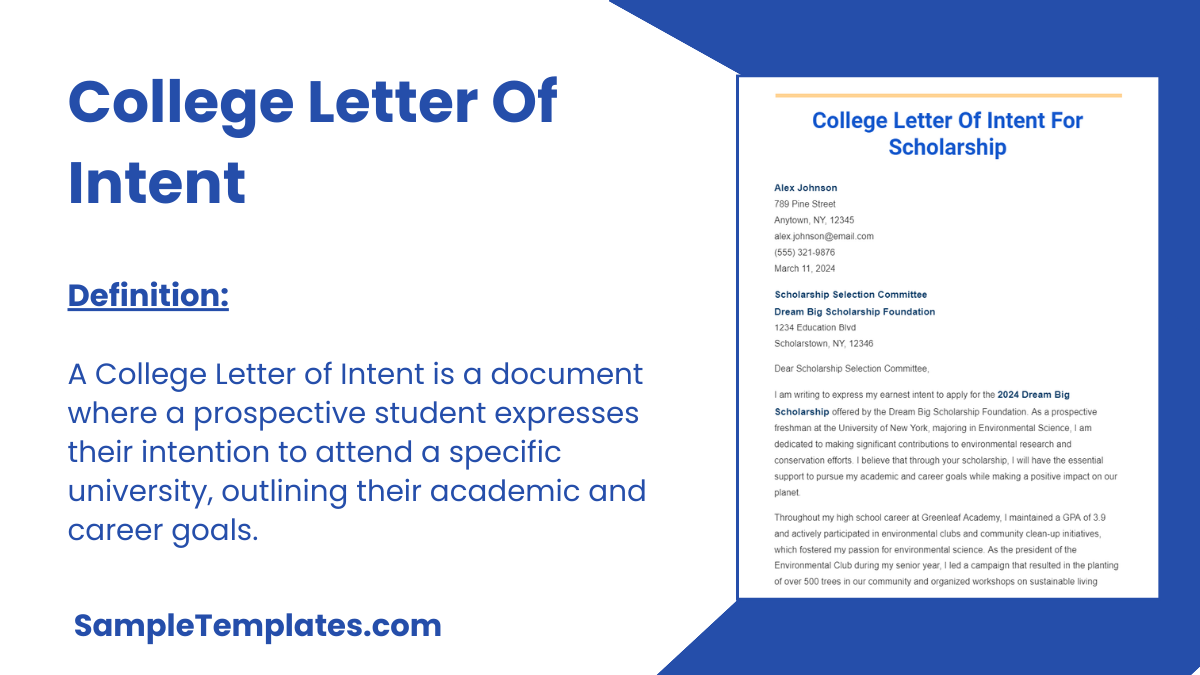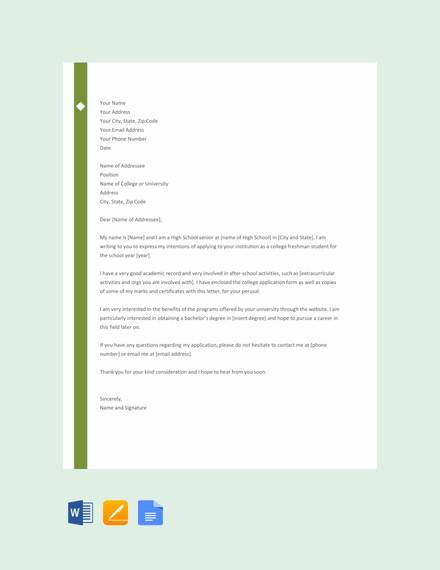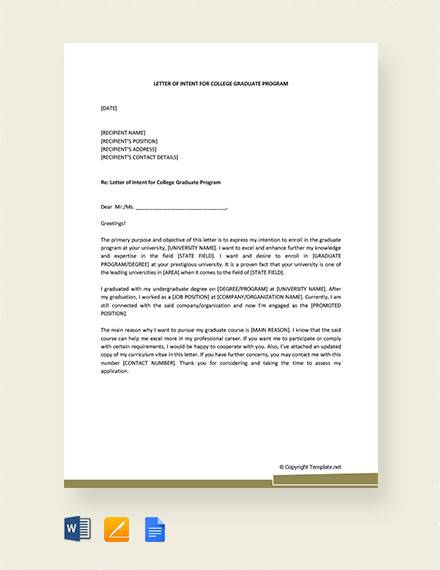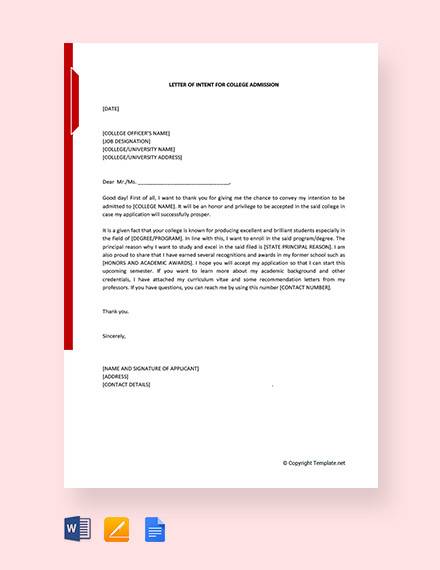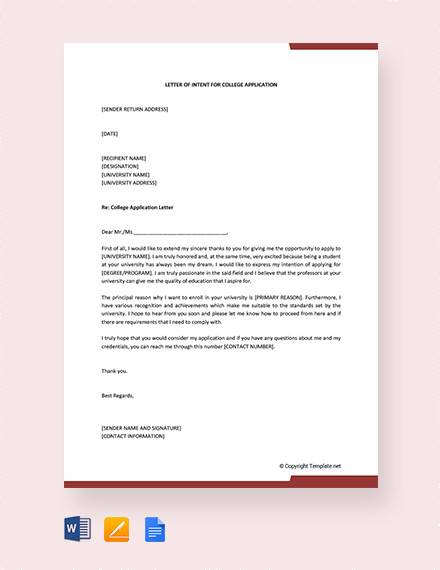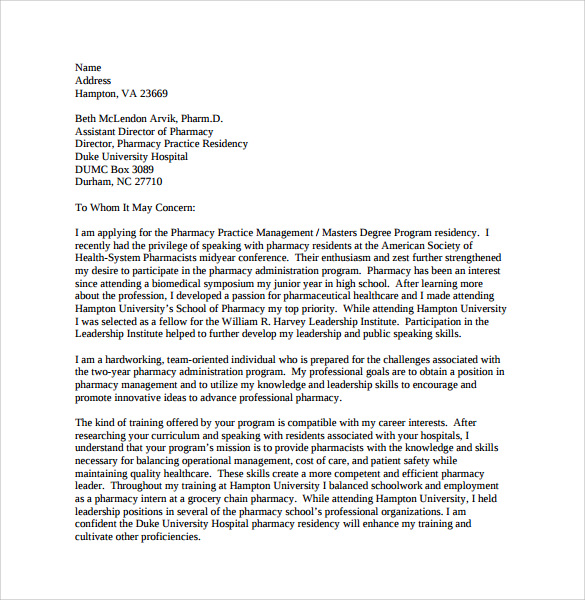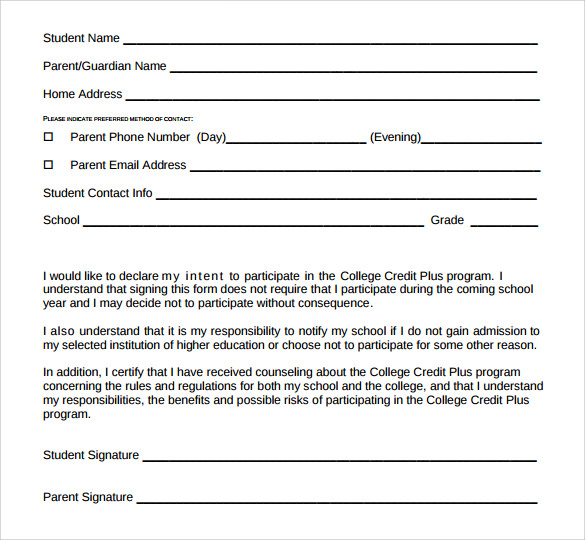If you’ve shortlisted your favorite college and looking forward to get the admission, then you need to write college letter of intent. This intent letter describes the reason why you should be given admission and what you like about the college. Sometimes, this letter is also sent by athletic students who have been offered scholarships.
The sample letter should emphasize more on what you can bring to the campus, addressing the letter correctly and make it stand out from other crowd. Check out sample college letter of intent available online to know the format and follow the same to draft one. You may also see letter of intent format.
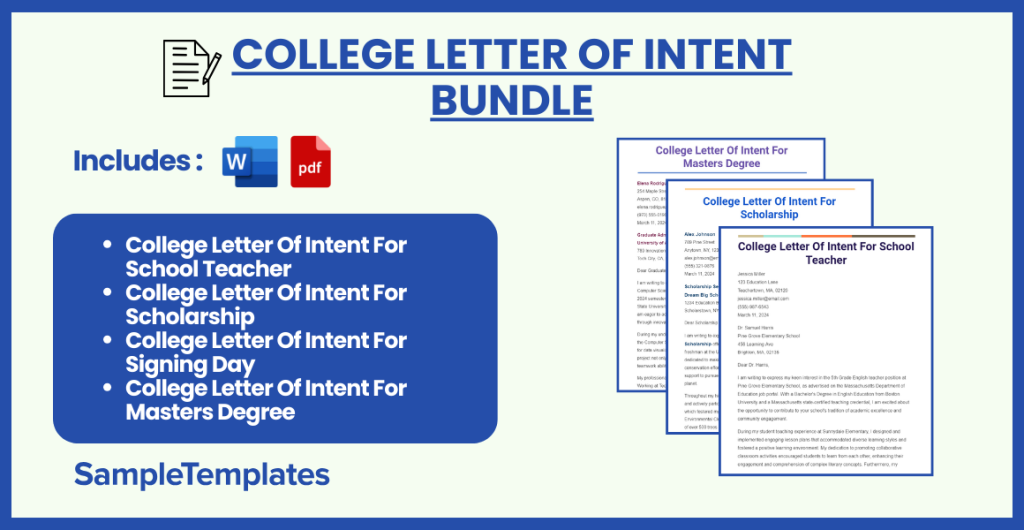
Download College Letter Of Intent Bundle
College Letter Of Intent For School Teacher
Jessica Miller
123 Education Lane
Teachertown, MA, 02120
[email protected]
(555) 987-6543
March 11, 2024
Dr. Samuel Harris
Pine Grove Elementary School
456 Learning Ave
Brighton, MA, 02135
Dear Dr. Harris,
I am writing to express my keen interest in the 5th Grade English teacher position at Pine Grove Elementary School, as advertised on the Massachusetts Department of Education job portal. With a Bachelor’s Degree in English Education from Boston University and a Massachusetts state-certified teaching credential, I am excited about the opportunity to contribute to your school’s tradition of academic excellence and community engagement.
During my student teaching experience at Sunnydale Elementary, I designed and implemented engaging lesson plans that accommodated diverse learning styles and fostered a positive learning environment. My dedication to promoting collaborative classroom activities encouraged students to learn from each other, enhancing their engagement and comprehension of complex literary concepts. Furthermore, my integration of technology and multimedia resources into lesson plans captivated students’ interests and enriched their learning experiences.
I am particularly drawn to Pine Grove Elementary School because of its commitment to fostering a love for reading and critical thinking among students. I admire the school’s innovative literacy programs and its emphasis on creating a supportive community that encourages students’ intellectual and emotional growth. I am eager to contribute my passion for English literature and effective teaching strategies to support Pine Grove’s objectives.
In addition to my academic background, my experience as a volunteer reading tutor for underprivileged children has equipped me with the skills to make a significant impact beyond the traditional classroom setting. I am enthusiastic about the opportunity to contribute to Pine Grove’s after-school reading program, aiming to create an inclusive and dynamic learning environment for all students.
I am confident that my educational background, teaching experience, and dedication to creating a nurturing yet challenging learning environment make me a strong candidate for the 5th Grade English teacher position at Pine Grove Elementary School. I am very excited about the opportunity to meet with you and discuss how I can contribute to your team. Thank you for considering my application. I look forward to the possibility of contributing to the success and vibrancy of Pine Grove Elementary School.
Sincerely,
Jessica Miller
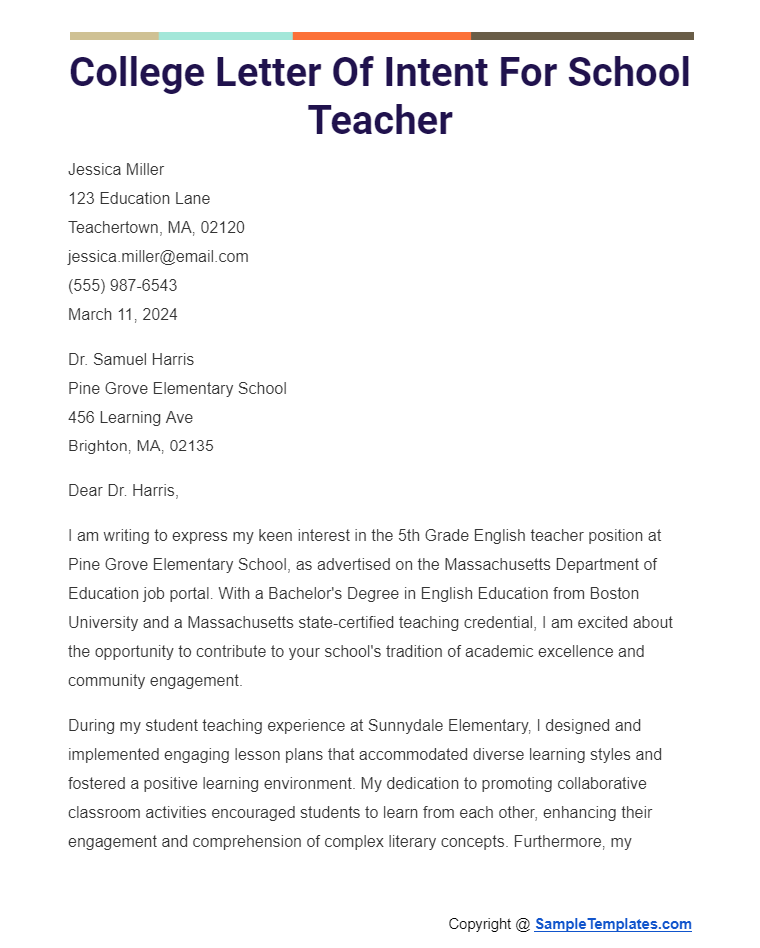
College Letter Of Intent For Scholarship
Alex Johnson
789 Pine Street
Anytown, NY, 12345
[email protected]
(555) 321-9876
March 11, 2024
Scholarship Selection Committee
Dream Big Scholarship Foundation
1234 Education Blvd
Scholarstown, NY, 12346
Dear Scholarship Selection Committee,
I am writing to express my earnest intent to apply for the 2024 Dream Big Scholarship offered by the Dream Big Scholarship Foundation. As a prospective freshman at the University of New York, majoring in Environmental Science, I am dedicated to making significant contributions to environmental research and conservation efforts. I believe that through your scholarship, I will have the essential support to pursue my academic and career goals while making a positive impact on our planet.
Throughout my high school career at Greenleaf Academy, I maintained a GPA of 3.9 and actively participated in environmental clubs and community clean-up initiatives, which fostered my passion for environmental science. As the president of the Environmental Club during my senior year, I led a campaign that resulted in the planting of over 500 trees in our community and organized workshops on sustainable living practices for students and residents. These experiences have not only prepared me for the academic challenges that lie ahead but have also deepened my commitment to environmental stewardship.
The Dream Big Scholarship’s mission to support students who are dedicated to making a difference resonates with my personal and academic aspirations. With the financial assistance from your scholarship, I will be able to focus more intently on my studies, engage in research projects, and participate in internships without the overwhelming burden of tuition and expenses. Furthermore, I am eager to contribute to the University of New York’s renowned environmental research community and collaborate with peers and professors on projects that address pressing environmental issues.
In addition to my academic achievements and extracurricular involvement, I have volunteered over 200 hours with local and national environmental organizations, including the Green Earth Initiative and Water Conservation Corps. These experiences have equipped me with practical skills and a broader understanding of environmental challenges, reinforcing my resolve to contribute to environmental solutions through my education and future career.
I am immensely grateful for the opportunity to apply for the Dream Big Scholarship. I am committed to utilizing the resources and knowledge gained through my education to contribute to meaningful environmental conservation efforts. I believe that with your support, I can further my academic achievements and work towards a sustainable future for all.
Thank you for considering my application. I look forward to the opportunity to further discuss my ambitions and how the Dream Big Scholarship can help achieve them. Enclosed, please find my academic transcripts, letters of recommendation, and a detailed account of my extracurricular activities. I am eager for the chance to contribute to our world’s betterment through my passion for environmental science.
Sincerely,
Alex Johnson

College Letter Of Intent For Signing Day
Jordan Williams
123 Victory Lane
Hometown, GA, 30301
[email protected]
(404) 555-1234
March 11, 2024
Coach Michael Thompson
Head Football Coach
State University
456 College Way
University City, GA, 30302
Dear Coach Thompson,
I am writing with great excitement and honor to formally express my commitment to join the State University football team as part of the National Signing Day on April 15, 2024. After thorough consideration of my options and numerous discussions with my family and mentors, I am confident that State University is the best place for me to grow both academically and athletically.
Throughout my high school career at Hometown High School, I have dedicated myself to achieving excellence on the football field and in the classroom. As a starting quarterback for three years, I led our team to two state championships and received All-State honors in my junior and senior years. Academically, I have maintained a GPA of 3.8, demonstrating my commitment to success in all endeavors.
The opportunity to play under your leadership, Coach Thompson, is one I hold in high regard. Your coaching philosophy, the team’s competitive spirit, and the academic support provided at State University align perfectly with my goals. I am eager to contribute to the team’s future successes and to further develop my skills under your guidance and that of your coaching staff.
State University’s reputation for excellence both on the field and in its academic programs has deeply influenced my decision. I am particularly excited about enrolling in the Business Management program, which I believe will provide me with a strong foundation for my future aspirations on and off the field.
I would like to extend my deepest gratitude to you, Coach Thompson, for your belief in my abilities and for offering me the opportunity to be a part of the State University family. I also want to thank my high school coaches, teammates, and my family for their unwavering support and guidance throughout my journey.
I am fully committed to upholding the values and standards of State University and the football team, and I look forward to contributing to our collective goals. Please find enclosed my signed National Letter of Intent along with other required documentation to formalize my commitment.
Thank you once again for this incredible opportunity. I am ready to face the challenges ahead and make a significant impact both as a student and as an athlete at State University.
Sincerely,
Jordan Williams
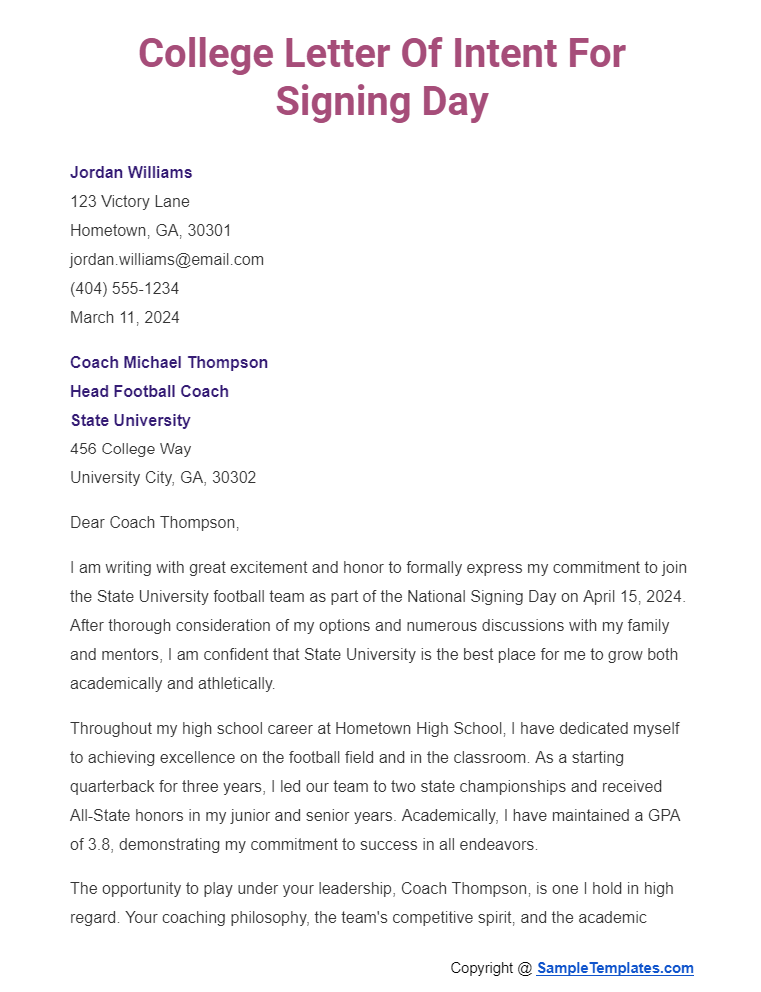
College Letter Of Intent For Masters Degree
Elena Rodriguez
254 Maple Street
Aspen, CO, 81611
[email protected]
(970) 555-0198
March 11, 2024
Graduate Admissions Office
University of Advanced Technology
789 Innovation Drive
Tech City, CA, 94016
Dear Graduate Admissions Committee,
I am writing to express my enthusiastic application for the Master of Science in Computer Science program at the University of Advanced Technology (UAT) for the Fall 2024 semester. With a Bachelor of Science in Information Technology from Colorado State University and three years of professional experience as a software developer, I am eager to advance my expertise and contribute to the field of computer science through innovative research and technology development.
During my undergraduate studies, I maintained a GPA of 3.7 and actively participated in the Computer Science Club, where I led a team project developing an open-source tool for data visualization that is now used by over 200 students and faculty members. This project not only honed my technical skills but also cultivated my leadership and teamwork abilities.
My professional experience has further solidified my passion for computer science. Working at TechSolutions Inc., I contributed to the development of scalable web applications that improved user experiences for thousands of clients. These experiences exposed me to the challenges of developing user-centric solutions and the importance of continuous learning and innovation in technology.
The Master’s program at UAT stands out to me for its cutting-edge research facilities, distinguished faculty, and a curriculum that emphasizes both theoretical foundations and practical applications of computer science. I am particularly interested in the research being conducted by Professor Jane Smith on artificial intelligence and machine learning. I believe that under her mentorship, I can explore my research interests in developing AI-driven solutions for enhancing cybersecurity.
My goal is to leverage the knowledge and skills gained from the Master’s program at UAT to contribute to the advancement of technology solutions addressing global challenges. I am committed to excellence and innovation, and I am excited about the opportunity to collaborate with like-minded peers and faculty members at UAT.
I have enclosed my resume, transcripts, and recommendation letters for your review. I am looking forward to the opportunity to further discuss how my background, skills, and aspirations align with the goals of the Master of Science in Computer Science program at UAT. Thank you for considering my application. I am eager to contribute to and learn from the esteemed community at the University of Advanced Technology.
Sincerely,
Elena Rodriguez

Browse More Templates On College Letter Of Intent
Letter Of Intent Sample For School
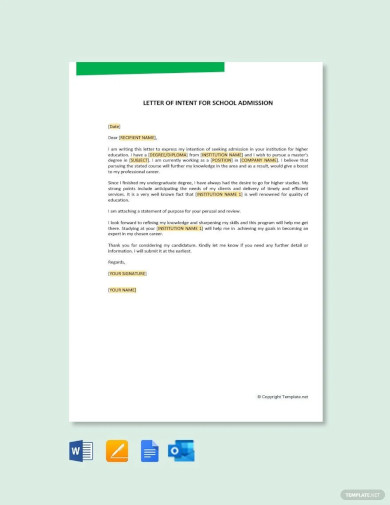
Letter Of Intent For College
Letter Of Intent For College Admission
Sample Letter Of Intent For College Admission
Letter of Intent For College Application
How to Write Letter of Intent for College?
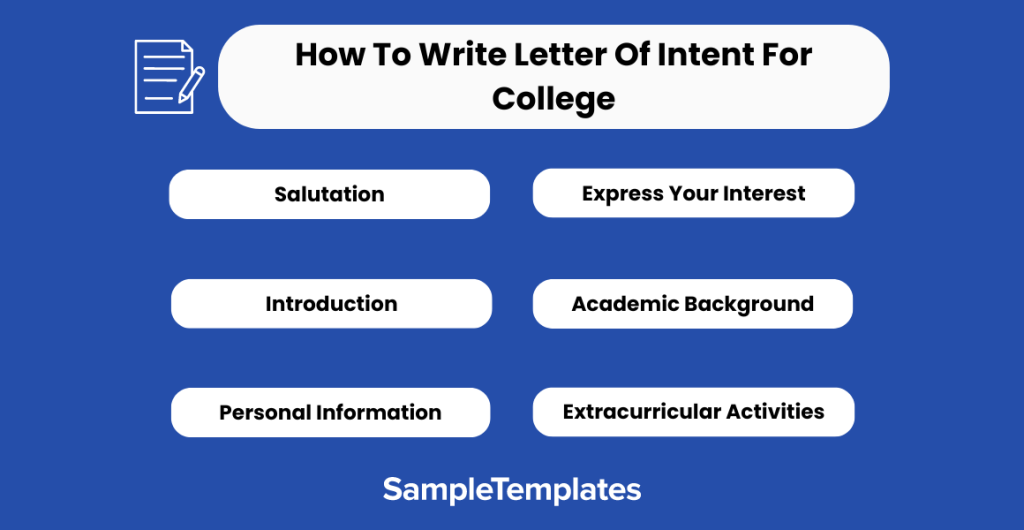
Writing a Letter of Intent (LOI) for college involves expressing your interest in a specific academic program or institution. Here’s a guide on how to structure and write an effective Letter of Intent for college:
1. Salutation:
- Begin with a formal salutation, addressing the recipient (often the admissions committee or department).
2. Introduction:
- Start with a brief introduction stating your name, the program you are applying for, and the purpose of your letter.
3. Personal Information:
- Provide concise personal information, including your academic background, major achievements, and relevant experiences.
4. Express Your Interest:
- Clearly state your interest in the college and the specific program. Explain why you are drawn to this particular institution and how it aligns with your academic and career goals.
5. Academic Background:
- Detail your academic achievements, emphasizing relevant coursework, projects, or research experiences that highlight your preparedness for the chosen program.
6. Extracurricular Activities:
- Discuss any extracurricular activities, leadership roles, or community involvement that showcases your well-rounded personality and commitment to contributing to the college community.
7. Unique Qualities and Skills:
- Highlight unique qualities, skills, or perspectives you bring to the college. Showcase what makes you a valuable and distinctive candidate.
8. Career Goals:
- Clearly outline your short-term and long-term career goals. Explain how the college and the specific program will contribute to your professional development.
9. Fit with the College:
- Demonstrate your understanding of the college’s values, culture, and academic offerings. Explain how you will contribute to and benefit from the college community.
10. Mention Specifics:
- Reference any specific professors, courses, facilities, or opportunities that attracted you to the college. Show that you’ve done your research. Summarize your main points and reiterate your enthusiasm for joining the college. Express gratitude for the opportunity to apply.
11. Formal Closing:
- Close the letter formally with a closing phrase (e.g., “Sincerely” or “Best Regards”) followed by your full name.
Example Of Letter Of Intent For Candidacy
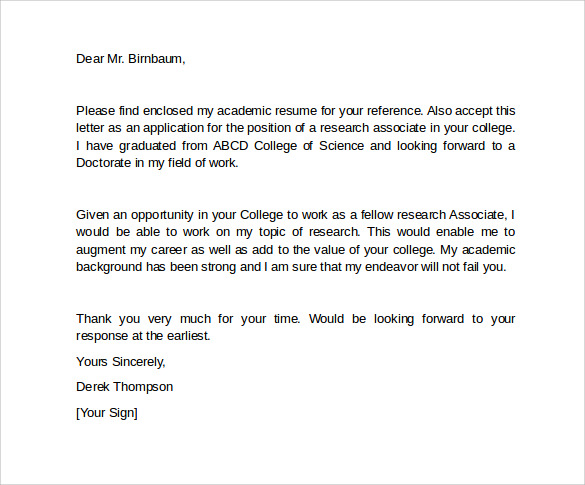
College Letter of Intent is a document which is provided by the student to the college. It includes the message that the candidate is the best person. It includes the details of the candidate, and the name of the college with other details. It is available for free and you can download both pdf and word document.You may also see letter of intent graduate school
College Letter Of Intent Format
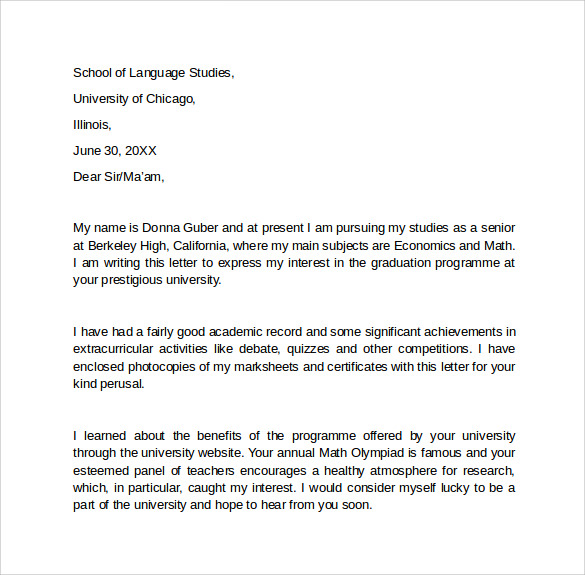
Importance of a Letter of Intent

A Letter of Intent (LOI) holds significant importance in various contexts, and its value lies in its ability to convey clear intentions, demonstrate commitment, and establish a positive impression. Here are key aspects highlighting the importance of a Letter of Intent:
- Expressing Serious Intentions:
- An LOI serves as a formal document expressing a person’s or entity’s serious intention to pursue a specific course of action. Whether in academics, business, or legal matters, it signals a commitment to proceed with further discussions or actions.
- College Admissions:
- In the context of college admissions, an LOI allows applicants to express their genuine interest in a particular institution and academic program. It provides an opportunity to showcase motivations, career goals, and alignment with the college’s values, contributing to a holistic evaluation of the applicant.
- Business Transactions:
- In business, an LOI is often used in negotiations and transactions. It outlines the preliminary terms, conditions, and expectations of a potential agreement. While not legally binding, it sets the stage for more detailed contracts and helps parties gauge each other’s intentions.
- Real Estate Transactions:
- In real estate, an LOI is commonly used by prospective buyers to signal their interest in purchasing a property. It outlines the proposed terms and conditions, facilitating initial negotiations before formalizing the deal through a purchase agreement.
- Legal Agreements:
- In legal contexts, an LOI may be used to express a party’s intent to enter into a sample agreement or contract sample. While not a legally binding document in itself, it can provide a basis for negotiation and clarification of key terms before drafting a comprehensive contract.
- Mergers and Acquisitions:
- In the business world, LOIs are often utilized in mergers and acquisitions. They outline the broad terms and conditions of a potential deal, allowing parties to assess compatibility before investing time and resources in detailed due diligence.
- Grant Applications:
- For grant applications, an LOI can be a crucial component. It allows applicants to briefly outline their project, its objectives, and its alignment with the grantor’s mission. Successful LOIs often lead to an invitation to submit a full grant proposal.
- Job Applications:
- In the context of job applications, a letter of intent can be used to express one’s interest in a specific position or company. It provides an opportunity to highlight relevant skills, experiences, and enthusiasm for the role.
- Setting Expectations:
- Whether in personal or professional contexts, an LOI helps set expectations. It clarifies intentions, preventing misunderstandings and promoting transparency in relationships and transactions.
- Customization and Personalization:
- The act of writing an LOI allows individuals or entities to customize and personalize their expressions of intent. It provides a platform for conveying unique motivations, goals, and aspirations, creating a more tailored and impactful communication.
In summary, a Letter of Intent is a versatile and valuable tool that helps establish clear intentions, build understanding between parties, and pave the way for further agreements or actions. Its importance lies in its ability to facilitate communication, express commitment, and streamline processes in various professional and personal spheres.
College Letter Of Intent Template
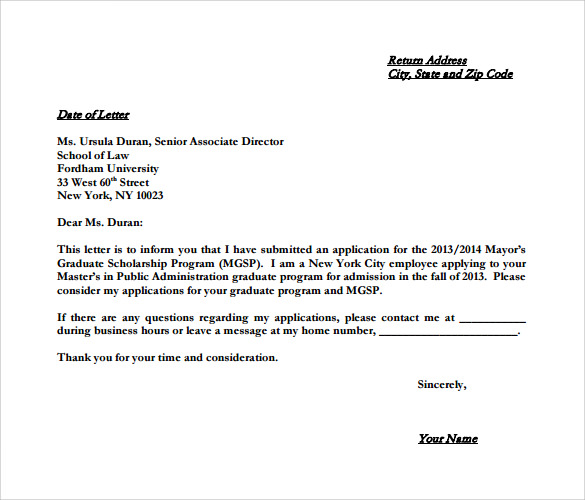
College Letter of Intent is a document that a candidate has to provide to the college. The letter mentions the qualities of the candidate. The example of the letter is available online. You can download the sample for free and it is available in both word and pdf format. You may also see letters of intent medical school
Letter Of Intent Sample For Student
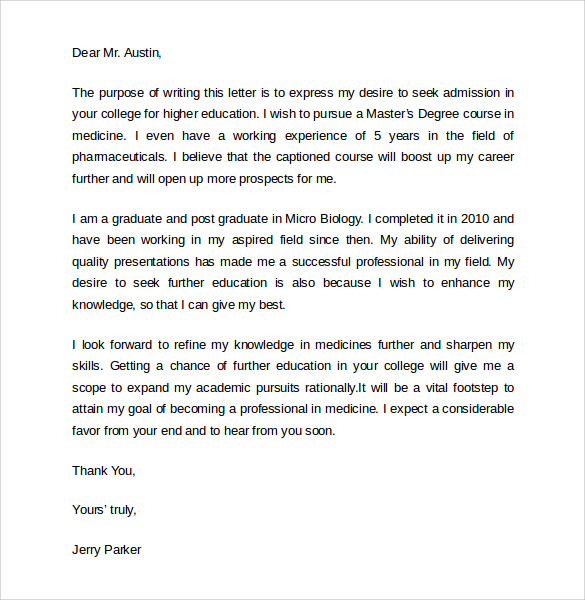
College Letter Of Intent is produced to the college by the candidate and it mention the qualities of the candidate that fits him/her in the college. It is available in numbers for free and you can download and customize as per your choice. It is available in both word and pdf document. You may also see letters of intent to purchase property.
Key Elements to Include in Your Letter of Intent
- Introduction: Start with a clear introduction of yourself or your organization, and state the purpose of the letter. Mention how you became aware of the opportunity, position, or program you’re interested in.
- Statement of Interest: Explicitly express your interest in the position, program, or opportunity, and explain why it appeals to you. Highlight what draws you to it and how it aligns with your goals or values.
- Background and Qualifications: Outline your relevant background, including education, work experience, skills, and achievements that make you a suitable candidate. Be specific about how your experiences prepare you for this opportunity.
- Specific Examples and Achievements: Include specific examples of your work or achievements that demonstrate your skills and qualifications. Use concrete evidence to illustrate your capabilities and how they relate to what you’re applying for.
- Your Goals and How They Align with the Opportunity: Discuss your short-term and long-term goals, and explicitly connect them to the opportunity. Explain how the position, program, or project will help you achieve these goals.
- Knowledge of the Organization or Program: Show that you have researched the organization, institution, or program you are applying to. Mention specific aspects that interest you and how you see yourself contributing.
- Call to Action: Include a polite call to action, such as expressing your desire for a meeting, interview, or further discussion. Make it clear that you’re eager to take the next steps and are available for further engagement.
- Closing and Contact Information: Conclude your sample letter by thanking the reader for considering your application. Include a professional closing, followed by your full name and contact information, ensuring they can easily reach you for follow-up.
Remember, your letter of intent should be personalized, concise, and clearly structured to effectively communicate your interest and qualifications.
College Letter Of Intent in PDF
College Letter Of Intent Outline
What is the LOI of college?
The Letter of Intent (LOI) for college, also known as a College Letter of Intent or College Admission Letter of Intent, is a formal document submitted by a prospective student to express their genuine interest in attending a specific college or university. This simple letter is typically submitted as part of the college application process and is intended to convey the applicant’s enthusiasm, qualifications, and reasons for choosing that particular institution. Here are key elements typically included in a College Letter of Intent:
- Introduction:
- Begin with a formal salutation and a brief introduction stating the purpose of the letter.
- Expression of Interest:
- Clearly express your interest in attending the college or university. Mention the specific program or major you are interested in.
- Academic Background:
- Provide a concise overview of your academic background, including your current or most recent educational institution, major, and any notable achievements.
- Why This College:
- Articulate why you are drawn to this particular college. Highlight specific features, such as academic programs, faculty, resources, campus culture, or extracurricular opportunities, that align with your educational and personal goals.
- Relevant Experiences:
- Share any relevant experiences, such as internships, research projects report, or extracurricular activities, that have influenced your decision to pursue education program proposal at this institution.
- Career Goals:
- Discuss your short-term and long-term career goals and explain how the college’s offerings will contribute to your professional development.
- Fit with College Values:
- Demonstrate an understanding of the college’s values and mission. Explain how your values align with those of the institution.
- Contribution to the Community:
- Express your eagerness to contribute to the college community. Discuss how your unique qualities, experiences, or perspectives will enrich the campus environment.
- Any Additional Information:
- Include any additional information that strengthens your application and showcases your qualifications. This could include relevant skills, achievements, or personal qualities.
- Closing and Gratitude:
- Close the letter formally, expressing gratitude for the opportunity to apply. Reiterate your enthusiasm for joining the college.
- Formal Closing:
- Sign off the letter formally with a closing phrase such as “Sincerely” or “Best Regards,” followed by your full name.
What are the 3 purposes of writing a letter of intent?
- Expressing Interest: A letter of intent is written to express genuine interest in a program, job, or opportunity.
- Outlining Qualifications: It outlines the writer’s qualifications, showcasing skills and experiences.
- Requesting Consideration: It formally requests consideration for admission, employment, or participation in a specific venture or program.
FAQs
1. What is a student letter of intent?
A student letter of intent is a brief, formal document expressing a student’s genuine interest in a specific academic program proposal or institution, outlining academic goals, and showcasing qualifications for admission.
2. What do you write in an intent letter?
In an intent letter, express genuine interest in a program or opportunity, outline relevant qualifications, convey enthusiasm, and articulate specific reasons for choosing or applying to a particular institution or role.
3. How long is a letter of intent?
The length of a letter of intent varies, but it is generally concise, typically ranging from 300 to 600 words. It should be long enough to convey essential information and intentions clearly.
4. Is letter of intent handwritten?
A letter of intent is typically typed and printed for a professional appearance. Handwritten letters may be acceptable in specific situations, but clarity and professionalism are crucial.
5. Who prepares a letter of intent?
A letter of intent is prepared by an individual who wishes to express their genuine interest in a program, job, or opportunity. It is written by the applicant or party involved.
6. Who benefits from a letter of intent?
Both the writer and the recipient benefit from a letter of intent. The writer expresses their interest and qualifications, while the recipient gains insights into the writer’s intentions and suitability.
In conclusion, this College Letter of Intent in pdf reflects my sincere commitment to contributing to and thriving in the academic community at [College/University Name]. I am excited about the prospect of further discussions and am grateful for the opportunity to be considered for admission to [specific program].
If you have any DMCA issues on this post, please contact us!
Related Posts
Teacher Letter of Recommendation Samples & Templates
Payment Letter Formats Samples & Templates
Business Proposal Letter to Client Samples & Templates
Company Introduction Letter Samples & Templates
Resignation Letter for Medical Samples & Templates
Lease Proposal Letter Samples & Templates
Letter of Inquiry Samples & Templates
Character Reference Letter Samples & Templates
Claims Letter Samples & Templates
Response Letter Sample & Templates
Follow Up Letter Samples & Templates
Sample Project Proposal Letter Templates
Donation Letter Samples & Templates
Addressing a Formal Letter Samples & Templates
Grievance Letter Samples & Templates
